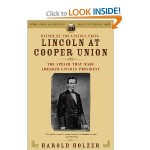 One would think the book’s subtitle “The speech that made Abraham Lincoln President,” would set up an unattainable expectation of greatness. After all, how could a book hold a candle to a great speech? Or perhaps the speech wasn’t so great after all and the author merely wanted to sell more books. And yet, I was wonderfully surprised to see that this really was an exceptional book about an exceptional speech.
One would think the book’s subtitle “The speech that made Abraham Lincoln President,” would set up an unattainable expectation of greatness. After all, how could a book hold a candle to a great speech? Or perhaps the speech wasn’t so great after all and the author merely wanted to sell more books. And yet, I was wonderfully surprised to see that this really was an exceptional book about an exceptional speech.
Harold Holzer is a world renowned expert on Abraham Lincoln and the Civil War. He has won several awards for the numerous books he has authored, co-authored, edited or co-edited on this the most widely studied President in our history. Holzer takes us back to February 1860, a few months before the convention that would nominate Abraham Lincoln on the Republican ticket for President. He examines the opportunity given to Lincoln to speak in New York City, where powerful men like Horace Greeley are looking to put forth an alternative to New York’s favorite son, William Seward. Through the negotiations of when and where – and the ultimate surprise upon arrival to find the location had been moved from Brooklyn to Manhattan – Holzer shows a remarkable ability to build tension and anticipation leading to the actual speech itself. He gives us a taste of a time, that in the days before movies and television and 24-hour internet, men were drawn to great speakers, especially of the political variety.
And a great speech it was. With several chapters leading up to the speech, Holzer helps us see the intricate research and effort Lincoln exerted over several months to preparing what he felt, presciently so, was to be the most important speech in his life. One chapter is assigned the duty of parsing the intricate language of this 90-minute magnum opus. As Holzer so captivatingly relates, the speech consists of three main sections: the first a historical accounting of the founder’s beliefs regarding slavery. Lincoln takes a line from a speech given by his long-time rival from Illinois, Senator Stephen Douglas, in which he says “Our fathers, when they framed the Government under which we live, understood this question just as well, and even better, than we do now.” With these words repeated over and over in his speech at Cooper Union, Lincoln cleverly recounts the votes that in toto demonstrate convincingly that the founders of our country believed that the federal government did, in fact, have the right and the obligation to restrict the spread of slavery into the new territories. In the second section, Lincoln addresses himself directly to “the Southern people,” whom he knows will not hear his speech, all while cleverly speaking to northern Republicans whose support he needs. The third, and shortest section, asserts that Republicans cannot relinquish their principle that slavery is wrong just to placate the South, and ends with his now famous line: “Let us have faith that right makes might, and in that faith, let us, to the end, dare to do our duty as we understand it.”
I read the full speech in the appendix before reading the rest of the book, then again – this time out loud, as if giving it myself – after finishing the chapter explaining its significance. While the speech as read is superb in itself, it is when spoken out loud as an oration that it gains its ultimate power. Holzer has captured this masterpiece with his own masterpiece. This book is a must read for anyone interested in Abraham Lincoln, history, or simply the power of a well prepared speech.
David J. Kent is an avid science traveler and the author of Lincoln: The Man Who Saved America, in Barnes and Noble stores now. His previous books include Tesla: The Wizard of Electricity and Edison: The Inventor of the Modern World and two e-books: Nikola Tesla: Renewable Energy Ahead of Its Time and Abraham Lincoln and Nikola Tesla: Connected by Fate.
Check out my Goodreads author page. While you’re at it, “Like” my Facebook author page for more updates!



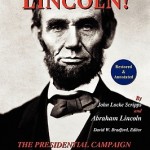 Vote Lincoln! The Presidential Campaign Biography of Abraham Lincoln is a 2010 annotated version of the first full biography of Abraham Lincoln published in 1860. Ostensibly written by John Locke Scripps, publisher of what would become the Chicago Tribune, much of the text was actually ghost written by Abraham Lincoln himself. Intended as a campaign biography, the book provides a revealing look at how Lincoln viewed his own life to that point.
Vote Lincoln! The Presidential Campaign Biography of Abraham Lincoln is a 2010 annotated version of the first full biography of Abraham Lincoln published in 1860. Ostensibly written by John Locke Scripps, publisher of what would become the Chicago Tribune, much of the text was actually ghost written by Abraham Lincoln himself. Intended as a campaign biography, the book provides a revealing look at how Lincoln viewed his own life to that point.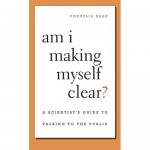 Am I Making Myself Clear? A Scientist’s Guide to Talking to the Public is a much needed book for scientific and non-scientific communities alike. Written by science writer (and former New York Times editor) Cornelia Dean, the book makes the case that scientists need to make “their work more accessible to the media, and thus to the public.” This doesn’t come naturally to most scientists, and so the book gives some practical tips on how scientists can accomplish this goal.
Am I Making Myself Clear? A Scientist’s Guide to Talking to the Public is a much needed book for scientific and non-scientific communities alike. Written by science writer (and former New York Times editor) Cornelia Dean, the book makes the case that scientists need to make “their work more accessible to the media, and thus to the public.” This doesn’t come naturally to most scientists, and so the book gives some practical tips on how scientists can accomplish this goal.
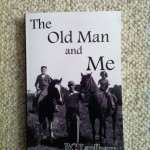 The Old Man and Me
The Old Man and Me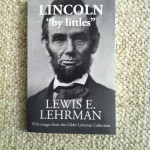 Periodically on this site I provide reviews of books about Abraham Lincoln. This is a review of Lincoln “by littles” by Lewis E. Lehrman, published by The Lehrman Institute in 2013.
Periodically on this site I provide reviews of books about Abraham Lincoln. This is a review of Lincoln “by littles” by Lewis E. Lehrman, published by The Lehrman Institute in 2013.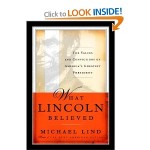

 I recently received a copy of a new book and was asked to read it and write a book review. This is that review.
I recently received a copy of a new book and was asked to read it and write a book review. This is that review. Each born on February 12, 1809 in very different parts of the world, Abraham Lincoln and Charles Darwin never met. Darwin spent five years traveling the world on The Beagle and eventually defined how we think about life. Lincoln spent four years staying pretty much in Washington DC and eventually came to define how we think of leadership.
Each born on February 12, 1809 in very different parts of the world, Abraham Lincoln and Charles Darwin never met. Darwin spent five years traveling the world on The Beagle and eventually defined how we think about life. Lincoln spent four years staying pretty much in Washington DC and eventually came to define how we think of leadership. Still, the book toggles between Lincoln’s life and Darwin’s life, comparing the two at key junctures in their maturation as thinkers, family men, and leaders. Because they were the same age many of these life choices occurred at roughly the same period of time. Contosta notes that both put off making decisions as to their life’s work since neither really wanted to follow too closely in the footsteps of their fathers. Lincoln traveled down the Mississippi on a flat boat before settling for some years in New Salem, Illinois. Darwin traveled around the world by ship for five years doing the research that would eventually lead to his most famous works. Once this phase was completed they each “found their calling,” Lincoln in politics and the law, Darwin in development and experimentation on what would eventually be called evolution.
Still, the book toggles between Lincoln’s life and Darwin’s life, comparing the two at key junctures in their maturation as thinkers, family men, and leaders. Because they were the same age many of these life choices occurred at roughly the same period of time. Contosta notes that both put off making decisions as to their life’s work since neither really wanted to follow too closely in the footsteps of their fathers. Lincoln traveled down the Mississippi on a flat boat before settling for some years in New Salem, Illinois. Darwin traveled around the world by ship for five years doing the research that would eventually lead to his most famous works. Once this phase was completed they each “found their calling,” Lincoln in politics and the law, Darwin in development and experimentation on what would eventually be called evolution. The book spends some time after the early death of Lincoln and the much later death of Darwin to assess their impact on the world. Clearly the emancipation of the slaves and the subsequent problems with reconstruction led to issues experienced for another century (and continuing). And clearly Darwin’s theory of natural selection challenged the conventional thinking of the day. History has shown that many would “adapt” the work of these two influential men to serve their own purposes (e.g., “social Darwinism,” which Darwin would have been aghast to see).
The book spends some time after the early death of Lincoln and the much later death of Darwin to assess their impact on the world. Clearly the emancipation of the slaves and the subsequent problems with reconstruction led to issues experienced for another century (and continuing). And clearly Darwin’s theory of natural selection challenged the conventional thinking of the day. History has shown that many would “adapt” the work of these two influential men to serve their own purposes (e.g., “social Darwinism,” which Darwin would have been aghast to see).






